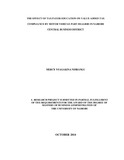| dc.description.abstract | Tax compliance is defined as the degree to which the tax paying community meets the tax obligation as set out in the appropriate legal and regulatory provisions Maxwell, (2003). He adds that compliant tax payers make timely, proper and accurate declaration to the tax authority and voluntarily settle all the due tax liabilities. Taxpayer compliance depends on economic incentives embedded in the tax structure and the effectiveness in detecting and penalizing non-compliance. At the margin, people engage in tax evasion when the expected benefits (lower taxes) are equal to the expected costs (bribes, punishment).The main objective of the study was to determine the effects of taxpayers’ education on the level of Value Added Tax compliance among the motor vehicle spare parts dealers in Nairobi CBD. The study employed a descriptive research design. Descriptive approach was integrated with survey design so as to collect comprehensive qualitative and quantitative data that enriches the outcome of the study. The study targeted all the motor vehicle spare parts dealers in the Nairobi CBD as the population of the study. Nairobi CBD is composed of 33 streets and an estimated number of 97 motor vehicle part dealers (Nairobi City Council, 2013.The study collected primary data. Semi-structured questionnaires were used; that is, with open and close-ended questions for qualitative and quantitative data respectively. The study targeted one person per motor vehicle parts dealers; either business owners or managers. A pilot test was conducted on 10 motor vehicle parts dealers in Industrial area to test the reliability and validity of the research instruments. The filled-in questionnaires were edited for consistency. The study established that tax compliance cost result to non-compliance of tax by motor vehicle dealers. Costs increase with the number of taxes that an entrepreneur is subject to, the complexity of the tax rules, the frequency of submitting tax returns, and the number of levels of government involved in levying and collecting tax. The study concludes that tax knowledge and education has a significant effect on tax compliance. Finally, perceived opportunity for tax evasion has a significant effect on tax compliance, therefore the tax system should target all motor vehicle dealers at all levels of turnover to seal loopholes that may encourage tax evasion. Tax systems should also enhance surveillance and monitoring to ensure that all the taxpayers are brought into the tax net. Specifically, motor vehicle spare part dealers, registering of all the firms for VAT should be done to ensure that they are obliged to file their returns | en_US |

